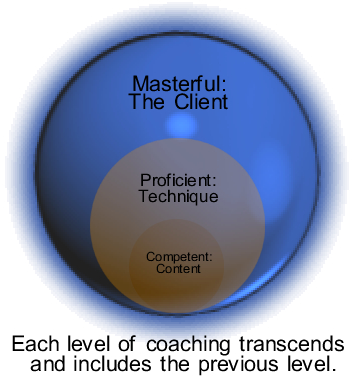Definition of Coaching:
School of Coaching Mastery (SCM) definition of coaching: Coaching is a customized conversation that empowers the client to get what s/he wants by thinking and acting more resourcefully.
International Coach Federation (ICF) definition of coaching: Coaching is partnering with clients in a thought-provoking and creative process that inspires them to maximize their personal and professional potential
Whether you call it life coaching, executive coaching, or business coaching, the profession of coaching is the byproduct of a new paradigm in human development. Scientists, philosophers and regular people are asking questions about life, such as, “How can people reach their full potential and enjoy greater happiness and success?”
As a result, new possibilities are opening up for many of us. In a very real sense, new questions create new realities and new realities lead to new opportunities for our happiness, success and fulfillment. Coaching is all about asking those new questions.
This new approach is empowering, but because it is new, people often have trouble understanding what it means. For this reason, sometimes it’s helpful to explore what coaching is not.
Coaching is not the same as counseling or psychotherapy, professions which evolved out of the disease model of traditional psychology. Clients generally seek out therapy or counseling when they are distressed by a problem and may need to heal.
Clients seek coaches when their lives are already okay, but they want to be even better. Coaching assumes clients are already “whole, complete and perfect” and are capable of making empowering choices. Having a skilled coach who believes in them, can help clients grow, act resourcefully, reach their goals and discover their greatness. Healing from a disease or problem is never the central focus of coaching.
One way to think of the distinction between psychotherapy and coaching is their relationship to health. Therapy takes a client from an unhealthy or negative state ( - ) and brings them up to a healthy or neutral state ( 0 ). While coaching begins at that neutral state and moves the client toward their full potential or positive state ( + ).

Coaching is also not consulting. A consultant is an expert in a particular field who assesses a client’s situation in relation to that field and makes recommendations on what to do to improve the situation.
A coach generally assists clients to assess their own situations and think - and act - more resourcefully about how to improve them. In other words, a coach helps the client to grow so they can reach their own goals independently, now and in the future, rather than become dependent upon an expert for help. Most consultants also do some coaching and most coaches also do a small amount of advising, so these professions are often confused, but generally, coaches help their clients be their best, while consultants advise clients on what to do.
Because coaching is popular and not regulated, people who are not coaches sometimes call themselves coaches. The following services are not coaching: consulting, training, seminar leading, counseling, therapy, internet marketing, selling, bill collecting; or offering advice on financial or legal matters, health issues, or religious teachings. Be suspicious of anyone who calls himself a coach, but who offers services in any of the foregoing areas.
Sometimes people who are unqualified to be licensed in a regulated profession will call themselves coaches to get around legal requirements. This is not only unethical, it is a red flag that the person is unqualified in that area.
Become a qualified coach and get certified:







